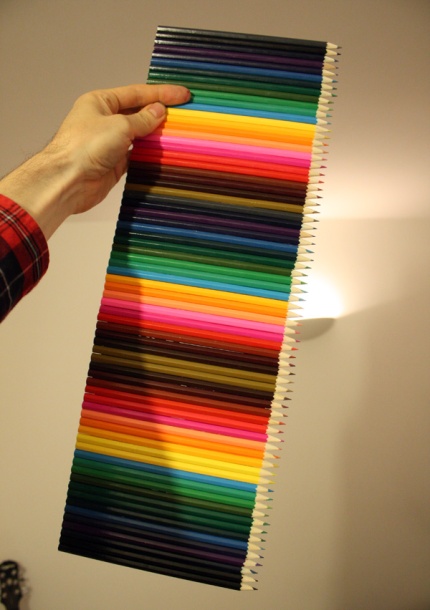Monday 13 December 2010
Links for the week 6-12th December
Monday 6 December 2010
NaBloPoMo: The Review
Friday 3 December 2010
Links for the week of 22-28 November
Tuesday 30 November 2010
Alt-metrics: Studying buzz around academic articles
The Internet in 1993
Saturday 27 November 2010
Google, DecorMyEyes, and social search
Lanyrd

I finally got round to checking out Lanyrd today - I'd heard good things about it on the twitters - and I really like the service.
Really cool concept video of object recognition and digital projection
Great concept video - plus it shows a really good use case.
I've seen a previous hack where a guy has put an iPad in a kitchen cupboard, but this demo takes it a step further, by directly projecting onto the kitchen surface.
It's this kind of computer interaction that excites me - if you consider how hacked Kinects could be used to do this cheaply, and if you get this connected online, then the possibilities are endless.
I'd love to see this as a inventory of all the things in the kitchen, which you could then search for recipes, or you could check remotely to see what you have. Really interesting to see where this goes.
Friday 26 November 2010
The Freebees Challenge
Massively impressed by this.... @documentally (one of the tweeters out there) hitch-hikes his way from Land's End to John O'Groats in just four days, with no money except for 5 Vodafone SIMs. He managed to get most of the way there using only his Twitter and Facebook. Really shows the power of networks.
Wednesday 24 November 2010
Volunteering check-in
Tuesday 23 November 2010
Perfect counterpoint to my 'Web of Distrust' post - College Credit for Improving Wikipedia
The project also teaches students an important lesson in media literacy, helping them understand and appreciate how to assess the quality of articles found, not just on Wikipedia, but in all the publications and sources they come across.
A perfect (optimistic) counterpoint to my post about the levels of trust in media today.
The folks behind Wikipedia are reaching out to universities and encouraging them to get students editing Wikipedia for credit. I just simply love this, and I wish Portsmouth was doing this. Well done to all involved.
Sunday 21 November 2010
Links for the week of 15-21 November 2010
Ranting about 'genetic discrimination'
Friday 19 November 2010
The Web Of Distrust
Thursday 18 November 2010
Net Neutrality? Nope say ConDems
Tuesday 16 November 2010
Short but sweet
Monday 15 November 2010
The Week's Links for 8 - 14th November
Saturday 13 November 2010
The connected house
- Temperature sensors - so I can adjust heating for energy efficiency.
- Electricity sensors - monitor the amount of electricity I'm using, for the whole house, and for particular appliances.
- Light sensors - so I can adjust lighting around the house, and maybe automate some lights.
- Phone sensor - detect's who's called, and when.
- Water sensor - to increase water use efficiency.
- Broadband speed test - see my blog about this.
- Doorbell sensor - so I can tell if someone's called while I'm out.
- Hacked Kinect - for advanced motion sensing, maybe even detect who's in the room.
- A screen - showing me real-time energy use, and other relevant information.
Friday 12 November 2010
10 pence per tweet
Programme or be programmed
Wednesday 10 November 2010
Bugger....
Automatic Broadband Speed Test
Monday 8 November 2010
Why Did You Buy Me That: Reindeer Candle Holder

Someone linked me to whydidyoubuymethat.com earlier, and I stumbled across this...
Seriously - What. The. Fuck.
Sunday 7 November 2010
Frustrating evening with RSS
Saturday 6 November 2010
Blekko on ReadWriteWeb
Thursday 4 November 2010
The Best Podcasts You'll Ever Hear! Or My Favourites At Least
Wednesday 3 November 2010
Building a website
Monday 1 November 2010
NaBloPoMo

Bottle Bank Arcade
Fun idea (thanks to this Slideshare for the link). Wonder if this could be reproduced or at KISC...
Not sure if something identical could be built, but something that makes recycling fun. Especially when the alternative is to force campers to do it under the watchful eye of a Pinkie (and when it's dumped the Pinkies have to do it themselves).
Sunday 31 October 2010
Zombie typewriter lets you play Zork text adventure
Jonathan Guberman of Toronto's Site 3 coLaboratory hackerspace wrote in to share his Automatypewriter project:
Introducing the Automatypewriter, a new way to experience interactive fiction! It's still a little rough around the edges (in particular, you can see that the spacebar sticks a little, and the whole thing needs to be tidied up), but you get the idea: the Automatypewriter is a typewriter that can type on its own, as well as detect what you type on it. By reading what it types to you and responding, it can be used interactively to play a game or participate in a story (in this case, Zork).See the project page for technical details.
Pretty cool eh? Especially on Halloween!
Saturday 30 October 2010
Pencil shelf
Today I made a shelf from coloured pencils by glueing them together. I was suprised at how strong it was using two layers of pencils.
The shelf brackets are made by cutting a single pencil case into two parts and glueing together. The sliding doors hide the screws.
I absolutely love this - I think I'm going to attempt making this at some point. From Dominic Wilcox's project 'Speed Creating', in which he tries to create something quickly every day for 30 days. And I think most of them are lessons on how simple equals awesome, of you think outside the box.
Wednesday 27 October 2010
Referencing: A Student's nightmare

Thursday 14 October 2010
The making of The Empire Strikes Back

Love these photos - seeing the reality creep into the unreal. Plus the black and white makes it look so dramatic.
Wednesday 13 October 2010
How To Stop Worrying And Learn To Love The Internet
I've just reread this (thanks to a link from @kevinmarks), and I've probably tweeted this before but I just had to post this. Douglas Adams hits so many nails on the head - "the reason we suddenly need such a word [interactivity] is that during this century we have for the first time been dominated by non-interactive forms of entertainment [...] We didn’t need a special word for interactivity in the same way that we don’t (yet) need a special word for people with only one head."
I've just spend half an hour writing up lecture notes for a class called Social Aspects of Computing, debating whether or not we live in an Information Society - it looks like some people need to catch up with reality. This was written 11 years ago!
This piece first appeared in the News Review section of The Sunday Times on August 29th 1999.
A couple of years or so ago I was a guest on Start The Week, and I was authoritatively informed by a very distinguished journalist that the whole Internet thing was just a silly fad like ham radio in the fifties, and that if I thought any different I was really a bit naïve. It is a very British trait – natural, perhaps, for a country which has lost an empire and found Mr Blobby – to be so suspicious of change.
But the change is real. I don’t think anybody would argue now that the Internet isn’t becoming a major factor in our lives. However, it’s very new to us. Newsreaders still feel it is worth a special and rather worrying mention if, for instance, a crime was planned by people ‘over the Internet.’ They don’t bother to mention when criminals use the telephone or the M4, or discuss their dastardly plans ‘over a cup of tea,’ though each of these was new and controversial in their day.
Then there’s the peculiar way in which certain BBC presenters and journalists (yes, Humphrys Snr., I’m looking at you) pronounce internet addresses. It goes ‘www DOT … bbcDOT… co DOT… uk SLASH… today SLASH…’ etc., and carries the implication that they have no idea what any of this new-fangled stuff is about, but that you lot out there will probably know what it means.
I suppose earlier generations had to sit through all this huffing and puffing with the invention of television, the phone, cinema, radio, the car, the bicycle, printing, the wheel and so on, but you would think we would learn the way these things work, which is this:
1) everything that’s already in the world when you’re born is just normal;
2) anything that gets invented between then and before you turn thirty is incredibly exciting and creative and with any luck you can make a career out of it;
3) anything that gets invented after you’re thirty is against the natural order of things and the beginning of the end of civilisation as we know it until it’s been around for about ten years when it gradually turns out to be alright really.
Apply this list to movies, rock music, word processors and mobile phones to work out how old you are.
This subjective view plays odd tricks on us, of course. For instance, ‘interactivity’ is one of those neologisms that Mr Humphrys likes to dangle between a pair of verbal tweezers, but the reason we suddenly need such a word is that during this century we have for the first time been dominated by non-interactive forms of entertainment: cinema, radio, recorded music and television. Before they came along all entertainment was interactive: theatre, music, sport – the performers and audience were there together, and even a respectfully silent audience exerted a powerful shaping presence on the unfolding of whatever drama they were there for. We didn’t need a special word for interactivity in the same way that we don’t (yet) need a special word for people with only one head.
I expect that history will show ‘normal’ mainstream twentieth century media to be the aberration in all this. ‘Please, miss, you mean they could only just sit there and watch? They couldn’t do anything? Didn’t everybody feel terribly isolated or alienated or ignored?’
‘Yes, child, that’s why they all went mad. Before the Restoration.’
‘What was the Restoration again, please, miss?’
‘The end of the twentieth century, child. When we started to get interactivity back.’
Because the Internet is so new we still don’t really understand what it is. We mistake it for a type of publishing or broadcasting, because that’s what we’re used to. So people complain that there’s a lot of rubbish online, or that it’s dominated by Americans, or that you can’t necessarily trust what you read on the web. Imagine trying to apply any of those criticisms to what you hear on the telephone. Of course you can’t ‘trust’ what people tell you on the web anymore than you can ‘trust’ what people tell you on megaphones, postcards or in restaurants. Working out the social politics of who you can trust and why is, quite literally, what a very large part of our brain has evolved to do. For some batty reason we turn off this natural scepticism when we see things in any medium which require a lot of work or resources to work in, or in which we can’t easily answer back – like newspapers, television or granite. Hence ‘carved in stone.’ What should concern us is not that we can’t take what we read on the internet on trust – of course you can’t, it’s just people talking – but that we ever got into the dangerous habit of believing what we read in the newspapers or saw on the TV – a mistake that no one who has met an actual journalist would ever make. One of the most important things you learn from the internet is that there is no ‘them’ out there. It’s just an awful lot of ‘us’.
Of course, there’s a great deal wrong with the Internet. For one thing, only a minute proportion of the world’s population is so far connected. I recently heard some pundit on the radio arguing that the internet would always be just another unbridgeable gulf between the rich and the poor for the following reasons – that computers would always be expensive in themselves, that you had to buy lots of extras like modems, and you had to keep upgrading your software. The list sounds impressive but doesn’t stand up to a moment’s scrutiny. The cost of powerful computers, which used to be around the level of jet aircraft, is now down amongst the colour television sets and still dropping like a stone. Modems these days are mostly built-in, and standalone models have become such cheap commodities that companies, like Hayes, whose sole business was manufacturing them are beginning to go bust.. Internet software from Microsoft or Netscape is famously free. Phone charges in the UK are still high but dropping. In the US local calls are free. In other words the cost of connection is rapidly approaching zero, and for a very simple reason: the value of the web increases with every single additional person who joins it. It’s in everybody’s interest for costs to keep dropping closer and closer to nothing until every last person on the planet is connected.
Another problem with the net is that it’s still ‘technology’, and ‘technology’, as the computer scientist Bran Ferren memorably defined it, is ‘stuff that doesn’t work yet.’ We no longer think of chairs as technology, we just think of them as chairs. But there was a time when we hadn’t worked out how many legs chairs should have, how tall they should be, and they would often ‘crash’ when we tried to use them. Before long, computers will be as trivial and plentiful as chairs (and a couple of decades or so after that, as sheets of paper or grains of sand) and we will cease to be aware of the things. In fact I’m sure we will look back on this last decade and wonder how we could ever have mistaken what we were doing with them for ‘productivity.’
But the biggest problem is that we are still the first generation of users, and for all that we may have invented the net, we still don’t really get it. In ‘The Language Instinct’, Stephen Pinker explains the generational difference between pidgin and creole languages. A pidgin language is what you get when you put together a bunch of people – typically slaves – who have already grown up with their own language but don’t know each others’. They manage to cobble together a rough and ready lingo made up of bits of each. It lets them get on with things, but has almost no grammatical structure at all.
However, the first generation of children born to the community takes these fractured lumps of language and transforms them into something new, with a rich and organic grammar and vocabulary, which is what we call a Creole. Grammar is just a natural function of children’s brains, and they apply it to whatever they find.
The same thing is happening in communication technology. Most of us are stumbling along in a kind of pidgin version of it, squinting myopically at things the size of fridges on our desks, not quite understanding where email goes, and cursing at the beeps of mobile phones. Our children, however, are doing something completely different. Risto Linturi, research fellow of the Helsinki Telephone Corporation, quoted in Wired magazine, describes the extraordinary behaviour kids in the streets of Helsinki, all carrying cellphones with messaging capabilities. They are not exchanging important business information, they’re just chattering, staying in touch. "We are herd animals," he says. "These kids are connected to their herd – they always know where it’s moving." Pervasive wireless communication, he believes will "bring us back to behaviour patterns that were natural to us and destroy behaviour patterns that were brought about by the limitations of technology."
We are natural villagers. For most of mankind’s history we have lived in very small communities in which we knew everybody and everybody knew us. But gradually there grew to be far too many of us, and our communities became too large and disparate for us to be able to feel a part of them, and our technologies were unequal to the task of drawing us together. But that is changing.
Interactivity. Many-to-many communications. Pervasive networking. These are cumbersome new terms for elements in our lives so fundamental that, before we lost them, we didn’t even know to have names for them.
Thursday 7 October 2010
Best Ikea hack ever?
Not sure if the Swedes would agree, but now I know what to do if I'm stuck freezing and hungry in Ikea...
Wednesday 6 October 2010
Want: Amazingly well designed Hong Kong house transforms into rooms
Seriously impressed with the design of this - especially considering the small flat I'm living in now.
Friday 1 October 2010
Insane Minecraft build
OK - This is insane....
For those that don't know Minecraft is a very popular indie game right now. Basically by day you can manipulate the (8-bit, very blocky) world around you, to make stuff to defend you from the hostile monsters that attack during the night. The game puts emphasis on creativity to make stuff, and also has a sandbox version where there are no monsters.
I especially love the bit where he says "This thing is fucking enormous". Can't wait to see if he gets the whole thing finished...
Thursday 30 September 2010
Blackboard mobile is another example of how mobile and location are changing everything — Scobleizer
This is a pretty good interview from Scoble (yeah, I find him quite annoying too but he does give a good interview).
The app itself is a definite WANT for me, having been at Portsmouth uni for just over a week now and definitely needing a better way to find buildings, rooms and other information. The UX looks really neat too, especially the 'windows' concept shown on the iPad app.
We use Blackboard software at Portsmouth and unfortunately it's shockingly bad - doesn't work in anything but IE, hides things in odd places, has terrible UX, looks ugly. But I think we must be using an old version as I had a look at the website and it shows a much nicer UI. It also sound like the app maker is more of an acquisition than an original Blackboard product.
It's good to know that there's some innovation in the education space of new tech.
Wednesday 29 September 2010
Star Wars in 3D :(
Monday 27 September 2010
3 months of awesome
Here's the last couple photos that I've got from the summer.
This is from my Overnight Climbing Workshop that I ran in the last couple of weeks with Joe (UK). We (climbing is always run with two people so we can have two ropes) had a German group who didn't speak much English, but we had some fun anyway. We hiked up to the Upper Hut - the mountain hut that the Centre owns at 1890m - in the afternoon, stayed overnight in the freezing cold (there was snow on the roof when we got there). The hut is only heated by a small wood fire and warmed up by cutting wood to make it fit. Then in the morning (as you can see it was glorious) we went out for some bouldering on nearby rocks, had some lunch back at the hut, and did some climbing (with ropes) and hiked home. I was a great 2 days of firsts for me - first 'real' time in the hut, and first outdoor climbing of the season (even though I didn't really get to climb properly).
On of my days off I went with Steffi (DE) and Eliza (AU) up to do Jegertosse (about 2100m) and then across to Doldenhornhutte (sorry it's in Swiss-German). Kind of the reverse route I did with Sara (IT) a few weeks before. We had some great views of Balmhorn (3698m) and Altels (3629m), and down the Kandersteg valley. Steffi broke the cross at the top, not realising that the only thing holding it together was a Swiss scarf, and we signed the book.
A couple of days after this I had another day off, so I decided to the Stand-First Traverse on my own. This is a guided hike that's really nice, with awesome views over the Kandersteg valley. It's quite a hard hike, that takes a long time (well it would unless you've been hiking for three months - it took me 4 hours), and it has some cool exposed bits and some scrambling. The hike passes the Buddhist monastery at the bottom and I walked past a monk outside, who Ithen met at the top! He'd gone the opposite way round to me and recognised me at the top, which was pretty cool. And - this is for my sister - I saw some donkeys on my way down.




















Finally I've got some pictures from Staff Day Out. This is the day when all the staff (Long Term and Short Term) have a day off together with a whole load of stuff to do. So first of all we when up the funicular railway to Niesen to have some breakfast at the top and take a group photo. The views are pretty amazing from the top, and it was pretty cool to be able to name most of the mountains. Then in the afternoon we went rafting down the Aare River (for obvious reasons I don't have any pictures of that), though it was more of a float as there wasn't much white water. We went swimming, had a mini campfire on the boat and tried to push our river guide in - was awesome. Then in the evening we went to the Hotel Victoria for a slap-up meal - the name of this type of traditional Swiss meal evades me at the moment - and for the staff awards. It was an awesome way to say goodbye to everyone.













This season was the best thing I've ever done, and I loved every second of it, it's hard to put it into words. The place, the views, the job, and most of all the friends I made were are incredibly amazing, and I hope that I'll see everyone again at some point. I wanted to say thank you to everyone for being awesome. I'm going back for 2 weeks in the winter, and I'll probably apply to go back next summer as well, and I can't wait. Especially as Salla (FI), Sara (IT), Emmy (SE) and Pete (UK) are going back this winter - it's going to be awesome seeing them again and hopefully seeing some more people next summer. I'd definitely recommend going there as a guest or as staff to anyone.
C'ya in December!















































